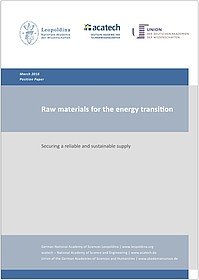Nationale Empfehlungen
Raw materials for the energy transition (2018)

Securing a reliable and sustainable supply
(2018, 104 Seiten, 4 Abbildungen, 3 Tabellen)
The energy transition affects Germany’s raw material requirements. If it is successfully implemented, the consumption of fossil energy sources such as coal, oil and natural gas will decrease. Moreover, even during the period of transition towards a more sustainable energy system, carbon emissions could be reduced by replacing coal with natural gas. In addition, bioenergy could help offset the volatile feed-in of wind and solar energy, thus contributing to a stable energy supply based on renewable energies. At the same time, however, the expansion of renewable energy plants, storage systems and intelligent grids creates an increased demand for elements such as steel, copper, cobalt, lithium, rare earths, the platinum group elements, indium or tellurium.
From a geological point of view, there are sufficient metals and energy resources around the world to create a climate-friendly energy system by 2050. The crucial point, however, will be to ensure that the economic viability of the respective investments is not ruined by any sharp increase in the prices of the resources required. If the German economy is to secure its long-term supply of raw materials, a forward looking political strategy is required. This position paper presents measures apt to contribute to a secure, affordable, environmentally friendly and socially acceptable supply of raw materials for the energy transition.

Elmar König
Leiter der Abteilung Wissenschaft – Politik – Gesellschaft, Leiter Berliner Büro
| Tel. | 030 203 8997 - 865 |
| Fax | |
| elmar.koenig (at)leopoldina.org |
